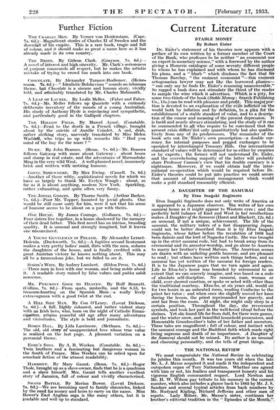A DAUGHTER OF THE SAMURAI _ By Etsu Inagaki Sugimoto
Etsu Inagaki Sugimoto does not only write of America aa it appeared to a Japanese observer. She writes of her own samurai' home as it might appear to Western eyes ; and the perfectly held balance of East and West in her recollections makes A Daughter of the Samurai (Hurst and Blaekett, 12s. 6d.) an unusual, if not a unique, achievement. The life of the samurai, the military 'rulers- of a fast disappearing Japan, could not be better described than it is by Etsu Inagaki Sugimoto, whose father before the revolution of 1868 had been daimio and the lord of Nagaoka Castle. She was brought up in the strict samurai code, but had to break away from its ceremonial and its ancestor-worship, and go alone to America, to marry her brother's friend Matsuo. The American scenes are drawn with an unfailing gentle humour, and are pleasant to read ; but others have written such things before, and no samurai has yet written of the samurai for foreign readers. It is to the Japanese pages that we turn again and again. _Life in Etsu-bo's home was bounded by ceremonial to an extent that we can scarcely imagine, and was based on a code of absolute self-discipline. No samurai, man, woman or child, ever showed emotion, or spoke or acted with other than the traditional courtesy. Etsu-bo, at six years old, would sit' for two hotirs in an unheated foom,-reading Confucius to the priest her tutor ; and when once she slightlY moved her knee during the lesson, the priest reprimanded her gravely, and sent hez from the room. At night, she might only sleep in a certain position. Throughout the day, she reverenced symbols, and took her part in the well-loved ritual before the shrines. Yet slfe found life far from dull, for, theie-were games,' and the winter snow, and beautiful household possessions, and Honourable Grandmother's tales of her father and ancestors.' These tales are magnificent ; full of colour, and instinct with: the samurai courage and the Buddhist faith which made righti living supreme and death of no importance. A Daughter of: the Samurai should not be- missed. Its author is an unusual'
and charming personality, and she tells of great things. I






































 Previous page
Previous page